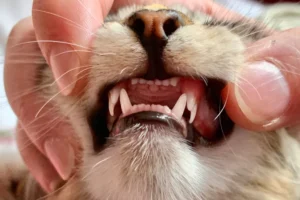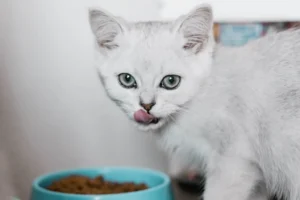Have you ever noticed that your cat’s gums are black? Wondering why that is the case? Here’s a detailed look at why cats have black gums.
An Overview of Cat Gums
Have you ever taken a peek at your cat’s gums? These fleshy tissues play an essential role in your feline friend’s overall health. Normally, a cat’s gums should appear pink or light pink in color, indicating good circulation and oxygenation.
Gums serve as a protective barrier for the sensitive tissues and bones in your cat’s mouth. They also help anchor the teeth in place and protect against potential infections. Checking your cat’s gums regularly can provide vital clues about their well-being.
Causes of Black Gums in Cats
If you notice that your cat’s gums are black instead of the usual pink hue, it may raise some concerns. However, there could be various reasons behind this unusual pigmentation.
Natural Pigmentation : Some cats naturally have black gums due to their genetics. Certain breeds, like Bombay or Sphynx cats, are more prone to having darker gums.
Potential Health Issues : While natural pigmentation is possible, black gums can also be a sign of underlying health issues. Conditions like gingivitis, oral infections, or gum disease could cause changes in gum color.
Breed Differences : As mentioned earlier, certain breeds are more predisposed to having black gums. If you have a breed known for darker gum pigmentation, it might not necessarily indicate a health problem.
Age : As cats age, their gum color might change. Black gums in older cats could be a normal part of the aging process and not necessarily a cause for alarm.
Remember, any drastic change in your cat’s gum color should prompt a visit to the veterinarian. They can assess your furry friend’s overall health and determine if there are any underlying issues causing the discoloration.
Stay vigilant and keep an eye on your cat’s oral health to ensure they lead a happy and healthy life. Your furry friend relies on you to keep them in tip-top shape, so make sure to schedule regular dental check-ups to catch any potential issues early on.
Black Gums vs. Normal Gums: How to Tell the Difference
Have you noticed your cat’s gums turning black and wondering if it’s normal or a cause for concern? Black gums in cats are not typical and can indicate underlying health issues. To differentiate between black gums and healthy pink gums in your feline friend, here’s what to look out for:
Black Gums: If your cat’s gums appear dark or black in color, it could be a sign of dental disease, oral melanoma, or other medical conditions. Additionally, if the gums are swollen, bleeding, or your cat is experiencing bad breath, it’s essential to schedule a vet visit promptly.
Normal Gums: Healthy cat gums should be pink in color, with a thin line of pigmentation near the teeth. They should also be moist, smooth, and free from any swelling or discoloration. Normal gums signify good overall health in cats.
If you notice any changes in your cat’s gum color or texture, it’s best to consult with your veterinarian for a proper evaluation. Early detection of any issues can lead to timely treatment and better outcomes for your furry companion.
Health Issues Associated with Black Gums
The color of a cat’s gums can provide valuable insight into their overall health. While black gums in cats are not common, they can be a warning sign of various health concerns. Here are some health issues associated with black gums:
Dental Disease: Black gums in cats can be a result of periodontal disease, a common condition caused by the build-up of plaque and tartar on the teeth. This can lead to inflammation, infection, and discoloration of the gums.
Oral Melanoma: Melanoma, a type of skin cancer, can also affect a cat’s gums. Oral melanoma can present as black pigmented lesions on the gums and may require surgical intervention for treatment.
Medical Conditions: Certain medical conditions, such as kidney disease, anemia, or immune system disorders, can manifest as changes in gum color. Black gums may indicate an underlying health issue that requires medical attention.
If you observe black gums in your cat, it’s crucial to seek veterinary care promptly. A thorough examination and appropriate diagnostic tests can help determine the cause of the discoloration and ensure the best possible care for your feline companion.
Treating Black Gums in Cats
If you notice your cat has black gums, it’s essential to determine the root cause for appropriate treatment. Firstly, take your furry friend to the vet for a thorough examination. Next, treatment will depend on the underlying issue. If it’s due to dental disease, your vet may recommend a professional cleaning and possible extractions. In cases of infection, antibiotics may be prescribed. For other potential causes, such as trauma or systemic issues, the vet will devise a tailored treatment plan. Regular dental check-ups are crucial to catch potential issues early and prevent black gums from worsening. Remember, a healthy cat is a happy cat!
Preventing Black Gums in Cats
Maintaining your cat’s oral health is key to preventing black gums. Start by brushing your cat’s teeth regularly with a pet-safe toothbrush and toothpaste. Additionally, provide dental treats or toys to help reduce plaque buildup. Ensure your cat has a balanced diet to support overall health, including dental health. Encourage regular dental check-ups with your vet to catch any issues early on. Remember, prevention is always better than cure when it comes to your cat’s oral health. By taking proactive steps, you can help keep those gums pink and healthy!
Additional Unique Insight:
Did you know that some cats may have naturally pigmented gums that are black or gray in color? While black gums can sometimes indicate an underlying issue, especially if they suddenly appear or are accompanied by other symptoms, for some cats, it may just be a normal variation in pigmentation. If in doubt, consult your vet to rule out any potential health concerns.
Fun Facts About Cat Gums
Have you ever wondered why cats have black gums? Well, here’s a fun fact for you: cat gums can appear black due to the presence of a pigment called melanin. This pigment is responsible for giving cat gums their dark color, similar to how it affects human skin and hair. So, next time you see your cat’s black gums, remember it’s all thanks to melanin!
The Bond Between a Cat and Its Owner: Understanding the Importance of Monitoring Your Cat’s Oral Health
Monitoring your cat’s oral health is crucial for their overall well-being. Regular dental check-ups can help detect any issues early on and prevent dental problems from escalating. By keeping an eye on your cat’s gums and ensuring they are healthy and pink, you can help maintain their oral hygiene and prevent serious health issues down the line. Remember, a healthy mouth equals a happy cat!
Alex, a passionate animal lover, has experience in training and understanding animal behavior. As a proud pet parent to two dogs and three cats, he founded AnimalReport.net to share insights from animal experts and expand his knowledge of the animal kingdom.









